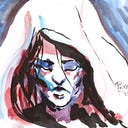Member-only story
Antisemitic Censorship

ART SPIEGELMAN — THE COMPLETE MAUS — PENGUIN BOOKS GB — 2003
This book is rather old and yet it is brought back to the limelight of the educational stage by the decision of some school councils or other educational authorities, local so far, to ban the book from high school libraries. That decision is typical censorship in the country that pretends they are the champions of democracy and freedom of expression. What is freedom of expression if the freedom to circulate what has been freely produced is negated or at least limited?
But what is so fiery about this book that some Parent Teacher Associations (PTAs) collect their tomahawks or hatchets and get on the warpath against this book, which is decades old and had never been confronted with such narrow-mindedness because censorship is always narrow-very-narrow-mindedness.
The book is the story of a Jewish family from Poland confronted in the late 1930s and during the Second World War with the final solution, the genocide of the Jews in Europe under the responsibility of Hitler, but not only Hitler far from it, because after the war, in modern Poland, the Poles considered the presence of Jews had been solved by this final solution. Very few people (not only Jews, but also gypsies, political activists, Christians, gay and lesbian people, and of course all sorts of handicapped people and psychological “cases”) survived their involuntary final workcamp, shower session, laboratory experiment, and starvation, or simply bullets or beatings leading directly to the “ovens,” where they were roast-cremated into ashes scattered then over the vast plains around Auschwitz and Birkenau.
By following the trajectory of two survivors, married before deportation and who, out of pure luck, managed to survive separately and to be reunited after the war for a second honeymoon that will lead to a second son, the first one having disappeared into the deportation procedure and ordeal. And it is this second son of their second chance who collected what he could from the memory of his father, his mother having died quite sometime before, and he is telling us this old story he systematically frames into the present time when he is questioning his father and following his slow decay into death.
